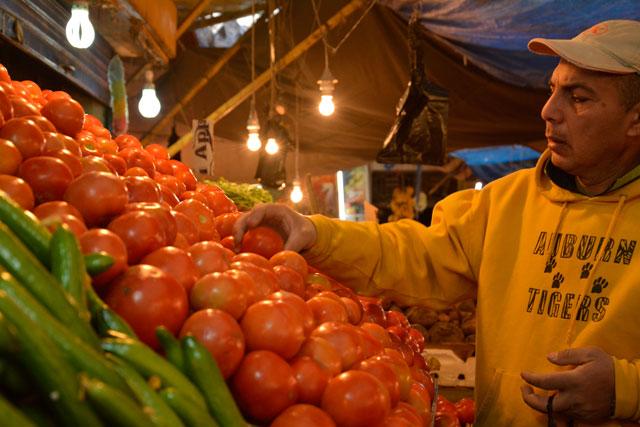You are here
Middlemen drive up fruit, vegetable prices at central market — report
By JT - Aug 15,2016 - Last updated at Aug 15,2016
AMMAN — The rising costs of fruit and vegetables hitting consumers can be blamed on a multi-layered system of middlemen –– mainly guest workers –– involved in the sale of produce from the central market to retailers, an investigative report by Amen FM revealed recently.
A report on the radio station, an affiliate of the Public Security Department (PSD), said that non-Jordanian intermediaries lengthen the supply chain by purchasing the bulk of the fruit and vegetables that farmers bring to the Greater Amman Municipality (GAM)-run central market and then reselling the produce to other merchants, driving prices up for retailers and then for consumers.
The report, a copy of which was made available to The Jordan Times, said the majority of these middlemen are guest workers.
The administration of the market, affiliated with GAM, closes the market between midnight and 4am, and allows merchants to enter the facility.
Retailers interviewed in the field voiced their objection to the timing of the closure, noting that they travel long distances to buy goods from the market, and it takes them some four hours to buy what they need and return to their shops.
The big “shock” retailers have become accustomed to when arriving at the market and find the fruit and vegetables they had agreed to purchase from the merchants sold to others, and they only find what the “monopolisers” do not need, the PSD said.
The produce that is left is in bad quality, and retailers buy these fruit and vegetables for the same price as the high-quality products that “bigger” retailers have already bought, retailers told Amen FM, according to a PSD statement.
After a field investigation, the PSD personnel concluded that the “monopolisers” in the market are a group of guest workers and merchants who make trades during the closure time, and the trade goes through several stages in which the same produce is sold more than once.
Trade starts when farmers bring their crops to the merchants who have shops in the market; afterwards, the merchants display what they bought from farmers in front of their shops.
The problem starts when guest workers in the market, during the closure time, buy and sell the best products multiple times, increasing their prices and compelling retailers to buy the quality products for higher prices, the PSD said.
Hassan, a retailer, told Amen FM that trade of fruits and vegetables often take place outside the authorised hours, in the absence of monitoring authorities.
Another retailer, identified as Salah, said that some monopolisers who want small quantities of different fruit or vegetables work together, and each one will buy a certain product in bulk to control prices.
Abdul Majeed Odwan, the executive director of markets at GAM, called the radio station and said that GAM’s role is only related to organisational and administrative issues, as well as providing a proper environment.
GAM does not interfere in pricing, which is subject to supply and demand, Odwan said, acknowledging the presence of “monopolisers who cannot be easily controlled”, the statement added.
Related Articles
AMMAN — Tomato prices are expected to drop at the central market in the next week, as farmers in Mafraq harvest their crops, Agriculture Min
AMMAN — The Jordan Farmers Union on Tuesday urged the government to address the rise in fruit and vegetable prices “due to the presence of m
AMMAN — A ministerial team on Tuesday visited the central market for fruit and vegetables, affiliated with the Greater Amman Municipality (G
















